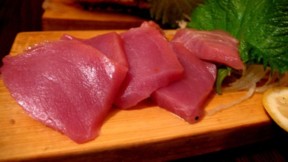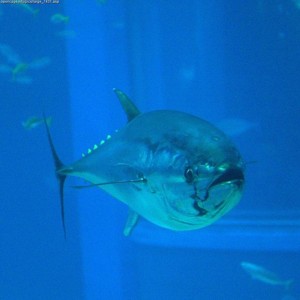The Australian Government has decided not to support a global ban on the trade of the northern variety of the bluefin tuna.
With northern bluefin populations falling dramatically, a proposal by Monaco to prohibit sale under the Convention on International Trade in Endangered Species has won US support, but not Australia's.
The Atlantic, or northern bluefin tuna has lost 72 per cent to 82 per cent of its original stock is under pressure also from illegal or unregulated fishing for the sashimi trade.

(Photo: Northern Bluefin or Thunnus thynnus)
Japanese, Korean, Indonesian and Taiwanese Bluefin tuna fleets use long line fishing which results in the incidental deaths of thousands of seabirds, particularly petrels and albatross.
However, the Australian Government has decided not to support a global ban on the trade of the northern variety of the bluefin tuna. Instead, the Environment Minister, Peter Garrett, has decided to support stronger trade control measures and fisheries management.
Japan, the biggest consumer of the fish, has indicated it may not honour the ban on northern blue fin tuna. Japan says that bluefin is not facing extinction, but acknowledges that recent rates of exploitation are probably not sustainable. Sushi is a popular dish in Japan, where fatty bluefin – called o-toro – sells for as much as 2,000 yen (£13) apiece in high-end Tokyo restaurants. The solution, they insist, is stricter management of fisheries, which have consistently exceeded their own quotas. They feel their "culture is under threat" - a culture of poaching, bullying and powerful lobbying!
The trade ban would allow individual countries to continue to catch atlantic bluefin tuna for domestic consumption. Imports from the East Atlantic and Mediterranean, which could be completely shut down by the threatened ban, would reduce Japan's sources of bluefin tuna by about 20 per cent.

(photo: Northern Bluefin)
The northern bluefin fishery has a poor record of compliance with control measures, and Japan consumes up to 80% of the world's tuna. Japan holds the line on whaling and they are also sending a signal that limits on bluefin tuna aren't up for debate either.
Southern bluefin tuna stocks have also been fished to even more dangerously low levels. Southern bluefin tuna has long been considered endangered and overfished, yet the Australian Government had not reduced the quota given to the Australian southern bluefin tuna industry since 1989.
The Southern Bluefin Tuna is one of the sea's most impressive creatures. A beautiful and powerful fish, it is well suited to a long life endlessly swimming the open seas. An adult Bluefin grows to around 200 kg and over 200 cm long. Its close relative, the Northern Bluefin Tuna, Thunnus thynnus, can grow to a massive 700 kg.
Glenn Slant, global marine program leader for TRAFFIC, a program of WWF, put the situation more bluntly last year: The southern bluefin tuna is at an all-time low, below 10 per cent of its original population size, and what that means is at any time it could collapse.
Our Government supports Japan's illegal whaling through non-action, and now they will be supporting their on-going cultural pursuit of tuna-based sushi eating through non-action and compliance.
The Australian Government continues to sanction fishing of southern bluefin tuna and perhaps is making this decision to block the protection of northern bluefin because it fears embarrassment that we continue to allow fishing of a critically endangered species in our own neighbouring waters.
Every indication is that the Bluefin Tuna population is crashing toward extinction, said Felicity Wade from The Wilderness Society last October. While it is heartening to see governments finally acting on its plight, the 20% international cut is inadequate for the crisis the blue fin tuna is facing. Australia had the largest quota reduction .
If we were serious about bringing this fish back from the brink, concluded Ms Wade, the fishery would be completely closed while populations recovered.
Sea Shepherd plans to oppose illegal bluefin tuna fishing in the Mediterranean region and will employ the same hard-line tactics it uses against Japanese whalers in the Antarctic waters, Paul Watson said.
The decision by Peter Garrett, and Japan, makes mockery of "fisheries management" and principles of "sustainability".

Recent comments